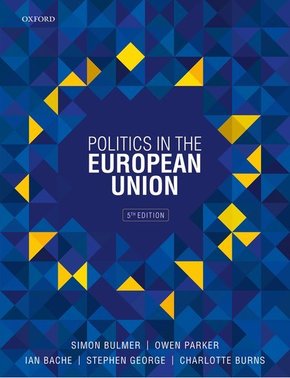Politics in the European Union
| Verlag | Oxford University Press |
| Auflage | 2020 |
| Seiten | 632 |
| Format | 19,1 x 3,1 x 24,5 cm |
| Print PDF | |
| Gewicht | 1070 g |
| Artikeltyp | Englisches Buch |
| ISBN-10 | 0198820631 |
| EAN | 9780198820635 |
| Bestell-Nr | 19882063EA |
Accessible and engaging, this is a complete guide to the past, present, and future of the European Union. An expert author team examine in detail the theory and history behind the EU, before moving on to explore the institutions and policies at work, giving readers a valuable insight to this complicated political body.
Politics in the European Union is an accessible and comprehensive introduction to the EU. Unique in its in-depth coverage of the history of the EU, the book explores a wide range of topics including institutions and policies, making it a complete guide to understanding the complex nature of the EU.
Now in its fifth edition, the text has been fully updated to include coverage of Brexit, the refugee crisis, and political developments within member states.
The text is enriched with a wide range of learning features, including end of chapter questions, which are designed to stimulate critical thinking, suggested further reading, EU timelines, and illustrative figures to help students take their learning further.
Inhaltsverzeichnis:
Part One: Theory
1: Theories of European Integration
2: Theories of EU Governance
3: Theorizing Consequences
4: Critical Perspectives
Part Two: History
5: From the End of the War to the Schuman Plan (the Late 1940s to the Early 1950s)
6: The 'Other' European Communities and the Origins of the European Economic Community (the Early 1950s to the 1960s)
7: The First Years of the European Economics Community (the 1960s and into the 1970s)
8: The Revival of European Integration (the Mid-1970s to the Late 1980s)
9: Maastricht and Amsterdam (the Late 1980s to the Late 1990s)
10: From Amsterdam to Lisbon (2000-09)
11: The EU in Crisis (2009-19)
Part Three: Institutions
12: The Institutional Architecture
13: The European Commission
14: The European Council and the Council of the European Union (EU)
15: The European Parliament
16: The Court of Justice of the European Union
17: Organized Interests
Part Four: Policies
18: Policy M aking and Policies in the European Union
19: The Single Market
20: Economic and Monetary Union
21: Agriculture
22: Environment and Climate
23: Freedom, Security, and Justice
24: Trade and Development Aid
25: Common Foreign and Security Policy
26: Enlargement
Rezension:
This latest edition is particularly useful in that it includes chapters on the subject area that students of EU Studies often find to be the most difficult and troublesome of all, namely integration theory. [This] is particularly useful not only because, unlike the contents of several competing texts, it is actually present, but also because it includes valuable descriptions and explanations of the historiography of European integration theory (which can be something of a mystery to EU newcomers), but also clear and lucid accounts both of the nature of already well-established theories, including intergovernmentalism and neofunctionalism, and also of new and emerging theoretical approaches, notably constructivism, critical political economy, and feminism. Neill Nugent, Manchester Metropolitan University, IEUSS Review of Books, January 2021

